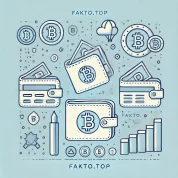Best Crypto Wallets 2025: Cold Storage, Mobile & Free Options
Crypto Wallets: Pro Tips, Memes & Security Hacks for 2025
Crypto wallets aren’t just digital vaults — they’re your passport to the decentralized jungle. Whether you’re stacking sats, farming yield, flipping NFTs, or just vibing with your ETH bags, choosing the right wallet is . Hot, cold, mobile, hardware, browser-based — the options are endless, and the stakes are real. Let’s break it down like a true degen, with alpha, memes, and no BS.
Types of Crypto Wallets: Hot vs Cold, Mobile vs Hardcore

There are two main species of wallets: software (hot) and hardware (cold). Hot wallets are fast, flexible, and perfect for daily use. Cold wallets are Fort Knox — offline, hacker-proof, and ideal for long-term hodling. Here’s the TL;DR:
- Mobile wallets = speed + convenience (Trust Wallet, Exodus)
- Desktop wallets = full control, better UI (Electrum, Atomic)
- Web wallets = browser-based, but risky AF
- Hardware wallets = offline security (Ledger Nano, Trezor, KeepKey)
- Cold wallets = no internet, no problem
Pro tip: If you’re holding more than $1K in crypto, get a hardware wallet. If you’re trading daily, use a mobile wallet with 2FA and backup seed phrases. Don’t be the guy who lost his ETH because he clicked a fake airdrop link.
Crypto Wallets Explained: What They Do & Why They Matter
Crypto wallets store your private keys — aka your access to the blockchain. No wallet = no crypto. They let you send, receive, swap, stake, and flex your NFTs. But they also protect you from rug pulls, phishing scams, and browser extensions that want to drain your bags.
- Without a wallet, you can’t interact with DeFi, NFTs, or Web3.
- Security is everything — choose wisely.
- Hardware wallets are immune to browser-based hacks.
- Software wallets are convenient but need extra protection.
- Enable 2FA, use strong passwords, and never share your seed phrase.
Wallet Types: Which One Fits Your Crypto Lifestyle?
Choosing a wallet is like choosing a weapon in an RPG. Are you a casual trader, a DeFi wizard, or a long-term hodler? Each wallet type has pros and cons:
- Mobile wallets = perfect for on-the-go swaps and staking
- Desktop wallets = ideal for managing multiple assets
- Web wallets = quick access, but vulnerable to hacks
- Hardware wallets = best for cold storage and peace of mind
- Cold wallets = no Wi-Fi, no worries
Free Crypto Wallets for Beginners (Yes, Even in Russia)

Not ready to drop $150 on a Ledger? No worries. Free wallets are everywhere — just make sure they’re legit. Here are some solid picks:
- Exodus — sleek UI, multi-chain support, free to use
- Trust Wallet — mobile-first, supports staking, NFTs, and DEXs
- MetaMask — the OG Ethereum wallet, browser-based, DeFi-ready
- WebMoney — hybrid wallet for crypto + fiat
- Look for wallets with ruble support and Russian-language UI if needed
Just remember: free doesn’t mean safe. Always back up your seed phrase, enable biometric login, and avoid shady browser extensions.
Ledger Nano: The Cold Wallet That Slaps
Ledger Nano is the hardware wallet equivalent of a bulletproof vest. It stores your private keys offline, supports 5,500+ assets, and connects via USB or Bluetooth. It’s pricey, but worth every sat.
- Offline = immune to browser hacks and phishing
- Supports BTC, ETH, SOL, ADA, TON, and more
- Ledger Live app = manage assets, stake, swap, and flex
- Recovery seed = your lifeline if you lose the device
- Cost ≈ $149, but cheaper than losing your crypto
Other Wallets Worth Checking

- Trezor — open-source, secure, and beginner-friendly
- KeepKey — sleek design, solid security, lower price
- Mobile wallets — fast but vulnerable
- Desktop wallets — great for multi-chain management
- Web wallets — only use if you hate your crypto
Buying a Hardware Wallet: Don’t Get Rekt
- Buy only from official sites or verified resellers
- Never buy used wallets — they could be compromised
- Check for sealed packaging and tamper-proof stickers
- Set it up yourself, generate your own seed phrase
- Store your seed offline — not in Google Docs, bro
Conclusion: Your Wallet, Your Rules

Crypto wallets are more than tools — they’re your armor in the Web3 battlefield. Whether you’re stacking TON, farming ETH, or flipping JPEGs, your wallet choice defines your security, speed, and sanity. Cold wallets like Ledger Nano are perfect for long-term storage. Hot wallets like MetaMask and Trust Wallet are great for daily action. Just don’t forget: one wrong click and it’s “gm, I got drained.”
Stay safe, stay backed up, and stay sovereign. Your keys, your coins.
Crypto Wallets FAQ: 8 Questions Degens Actually Ask
- Q: What’s the safest wallet in 2025?
A: Ledger Nano X or Trezor Model T — both offer offline key storage and secure elements. - Q: Is MetaMask still safe?
A: Yes, but only if you use 2FA, avoid shady sites, and never store your seed online. - Q: Can I use Trust Wallet for staking?
A: Absolutely. It supports staking for multiple chains including BNB, SOL, and ETH. - Q: What’s the best wallet for TON?
A: Tonkeeper and Telegram Wallet are native options. Ledger also supports TON via Jetton integration. - Q: Are browser wallets safe?
A: Only if you know what you’re doing. OtherwiseWhat to Expect in 2026: Wallets Get Smarter, Safer & More Sovereign
2026 is shaping up to be a breakout year for crypto wallets — not just as storage tools, but as full-blown Web3 command centers. Expect smarter wallets with built-in AI assistants, real-time phishing detection, and native support for zk-proofs and biometric authentication.
- Telegram-native wallets like Tonkeeper will likely evolve into multi-chain hubs, while hardware wallets may integrate with DePIN networks for physical asset tokenization. Free wallets will compete on UX, adding gasless swaps, social recovery, and Telegram bot extensions. Cold storage will get sleeker, with Ledger and Trezor pushing wireless, mobile-friendly models.
- And with regulatory heat rising, wallets will double down on privacy — think stealth addresses, MPC key management, and decentralized identity layers. Bottom line: wallets won’t just hold your crypto — they’ll protect your digital life, automate your DeFi moves, and become your gateway to the next-gen internet.
Final Thoughts: Your Crypto, Your Power
In the wild world of Web3, your wallet isn’t just a tool — it’s your shield, your sword, and your identity. Whether you’re stacking TON, farming ETH, flipping NFTs, or just vibing with your Telegram bots, the right wallet setup gives you freedom, security, and peace of mind. Don’t sleep on cold storage. Don’t ignore backups. And never, ever share your seed phrase — not even with your cat .
Crypto is about sovereignty. Your keys, your coins, your rules. So stay curious, stay protected, and keep building. The next bull run won’t wait for anyone — and your wallet is the first step to riding it like a pro.
Disclaimer
This content is for informational and educational purposes only. It does not constitute financial, investment, legal, or tax advice. Cryptocurrency involves risk, including potential loss of funds. Always do your own research (DYOR), use trusted wallets, and consult with qualified professionals before making any crypto-related decisions. Fakto.top and its contributors are not responsible for any outcomes resulting from actions taken based on this article. Stay safe, stay smart, and never click random airdrop links.
